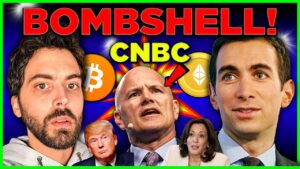In 2022, the dollar reached its highest level since the
early 2000 after experiencing a decade Of sustained growth. As of August 2024, the dollar has been trending
downward. Still, the dollar has appreciated against most major
currencies in 2024. The US dollar has stayed stronger than the rest of the
world for a number of factors, not the least of which The Fed has kept interest rates elevated and some
other global central banks have been moving in the Other direction. The power projection of the United States is greater
when the US Dollar is strong, and as the US dollar becomes weaker,
it's less capable of projecting Political power. But on the other hand, more American workers are
employed. The people who benefit from the strong dollar are
usually different people than would benefit from the Weak dollar. A strong dollar may reflect economic strength, but it
can have downsides for American consumers. The strong dollar tends to help consumers because it
gives them more purchasing power, but it Also means, generally speaking, that prices are going
to be higher at home. So there's a balance there. And striking that balance is a really difficult thing. The US president doesn't always want a strong dollar. As a result of that, presidents have taken direct
actions that led to the significant devaluation of the Dollar. We've been hurt, in my opinion, very badly by our own
Federal Reserve, who has also created a very Strong dollar. That's something nice about a strong
dollar, but it makes it much harder to do business Outside of this country. Here's what a strong or weak dollar means for American
consumers, and how that could impact a president's Economic agenda. The dollar's value depends on economic conditions in
the US and around the world, so it's difficult to label A strong dollar as simply good or bad. Overall, I actually don't like the word strength
because that has positive connotations. And really what we just mean is that it's more
expensive relative to where it was before. So dollars can buy more foreign things than it was
before. If you're somebody who likes to vacation a lot, you go
overseas, if you have a strong dollar, you get a very Favorable exchange rate, and you can buy more stuff. But a strong dollar can also have its downsides.
It's less good if you want to sell things to people who
have those currencies, because it means that everything You're selling is more expensive. It's possible demand for U.S. Goods abroad would decrease if international consumers
couldn't afford to buy those goods. American workers could then be negatively impacted. A strong dollar is generally bad for growth and can
lead to layoffs, particularly in manufacturing, which Is heavily exposed to global trade. And you can see empirically in the US in particular
these big declines in manufacturing employment when the Dollar appreciates a lot. You saw this in the early
80s. You saw it in the early 2000s. Usually a very weak economy boosts your exports,
because what you're trying to sell to the rest of the World is cheaper. So in that way, a weak currency can benefit on the
trade side and actually help A country earn some hard currency from somewhere else. But it also means importing is very expensive because
your currency doesn't buy much. The dollar really started to appreciate when we started
to see the first flare up of inflation. It began back in 2021. It really accelerated in 2022, and the Fed had to step
in and start raising interest rates to control Inflation, and that in turn had an upward pressure on
the dollar. And it has stayed pretty consistent since then. There's volatility. There always will be volatility with the dollar. But it was pretty much with the ascent of inflation
where we really saw that pronounced move higher. The Federal Reserve began raising interest rates in
March 2022, in an attempt to slow down the economy and Lower inflation. But as of August 2024, the dollar index has been
moving downward as investors anticipate rate Cuts. That the Fed, as it raises interest rates, makes the
dollar a more attractive investment vehicle around the World. So it's going to raise the value of the dollar
when you get that nice risk free Investment that you can just buy dollars or dollar
equivalent type of investments, that you get a very Nice return on them. And that's not been the case for
a long time. So higher interest rates do tend to push up the value
of cash and cash equivalents for Investors. On top of that, tariffs on imported goods can influence
the dollar's value.
The dollar is the world's dominant currency. It's used by an overwhelming number of nations and
companies As the way to pay for the transfer of goods and
services In an increasingly dominant world trading system. The dollar is used as a benchmark for other nations to
conduct Their foreign exchange policies, notably China. Imposing tariffs on imports or negotiating trade deals
can influence the balance of trade, which affects the Demand for and value of the dollar. During his time in office, former President Trump
implemented tariff policies against Chinese imports With the stated goal of addressing trade imbalances
and protecting specific American industries. President Biden also implemented tariffs on $18
billion worth of Chinese imports. Many experts believe those tariffs worsened the U.S. Trade deficit, which may have contributed to the
appreciation of the dollar. If you have big imbalances in trade across countries,
then that is destabilizing. It could actually be the case that tariffs make the
currency go up. The textbook answer is that tariffs hurt your
exporters because your currency appreciates, and then They're less competitive in foreign markets. The tendency is to think that you can preserve American
jobs by putting on high Levels of tariffs. But the high levels of tariff will make imported goods
also more Expensive for American producers who are using those
goods in the products that they Themselves make. And this was the case with the Trump
tariffs on steel and aluminum. We've now got some quite good empirical studies of
this. It didn't create very many new jobs in steel and
aluminum production, but it did increase the cost of Steel and aluminum for American manufacturers and made
them, as a result, less competitive. But often presidents have been upset about the
particular policy that the Fed is conducting. Trump is no exception. The Federal Reserve is a very interesting thing, and
it's sort of gotten it wrong a lot. And he's tending to be a little bit late on things. He gets a little bit too early and a little bit too
late. I feel a president should have at least say in there. Yeah. From a practical perspective, officials, presidents,
Federal Reserve chairs, those kind of things. They try to stay out of the way of the dollar.
They try to traditionally not move the dollar one way
or another, because it does cut both ways. And it's a very difficult thing to do. So it has been a tradition that top level policy
makers do stay away from that. Of course, Trump is the exception to a lot of rules,
and that's one of them that he was more Vocal about the way he wanted the dollar to go. Senator JD Vance, former President Trump's 2024 running
mate, has also expressed concern about the Impact of the strength of the dollar. In some ways you can argue that the reserve currency
status is a massive subsidy to American consumers, But a massive tax on American producers. President Biden dismissed concerns about the strong
dollar in October 2022. I'm not concerned about the strength of the dollar. I'm concerned about the rest of the world. Democratic presidential nominee Vice President Kamala
Harris has not commented about the strength of the Dollar. The Biden administration, as well as the
Harris and Trump campaigns, did not respond to CNBC's Request for comment in time for publication. Presidents in the past have taken direct actions that
led to the depreciation of the dollar, such as President Richard Nixon when he suspended the gold
standard in August 1971, or when President Ronald Reagan put together a coordinated effort with other
global economies to depreciate the value of the dollar In 1985. The best way of managing the decline of the dollar was
by this internationally agreed operation. If you try to do it unilaterally, you get much more in
the way of weird consequences. Unintended consequences. Nixon's decision to close the gold window was indeed
taken unilaterally. There was no need to consult Congress. Nixon promised, when he made this decision that it
wouldn't have any effect on American prices, and that Was absolutely untrue. Prices rose and the 1970s was the period that some
economic Historians consider as the great inflation in the
United States. But the other thing that really affects what the level
of the dollar will be is what The fiscal position of the United States is. That's a decision that then depends on Congress, and
it's going to be obviously something that can't Be done by the president just by saying this. He can't say we're going to have a big tax increase or
we're going to get a tax reduction. But he's got a bully pulpit and he would be in a good
position to do this.
The idea would be if the president has some kind of
congressional leverage, he's going to push through, or She is going to push through the agenda that they want
to push through. As the US grapples with the latest bout of inflation,
policymakers at the Fed, white House and in Congress Will have to consider the long term implications of
the dollar's future stability. We tend to think that nothing could ever dislodge the
dollar from this pre-eminent Status as the world's currency, and I think that that
view is Overblown and ultimately will be challenged. One possibility is getting rid of the US dollar
altogether and replacing it by cryptocurrencies. I think if they put that forward very, very clearly as
a campaign proposal, it would produce Horror. The world's reserve currency, which the US dollar is,
usually has an independent central bank. It has a strong, usually, military backing to provide
that security has deep and liquid Bond market that foreign investors can invest in. When we've seen concerns about events in the global
economy, whether it's the economy or geopolitical Events, the dollar has gone up, not down. It's seen as a safe haven. So you'd really in order to see something change
there, we really need a drastic set of Circumstances. Is the global reserve currency issue something to worry
about in the next six months? The next year? The next two years? No, but it's something to be keeping an eye on further
out into the future.




